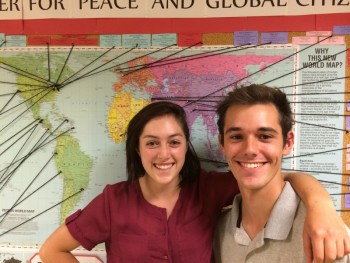CPGC Expands Post-Baccalaureate Fellowships Program in Year Two

Siena Mann and Devin Van Dyke (both '14) before departing for their international post-bac fellowships.
Details
The College's Center for Peace and Global Citizenship (CPGC) has long supported student work in the realms of social justice and civic engagement by funding internships, service learning expeditions, and research travel to expand and enrich learning opportunities outside the classroom walls. But recently the Center has extended the scope of its programming to include post-baccalaureate fellowships for recent graduates. Last year it debuted an opportunity for a recent graduate to work at Casa de los Amigos, a Quaker social action center in Mexico City that is focused on immigration and migration issues. And this year it launches a new public health fellowship at the non-governmental organization Solidarity and Action Against the HIV Infection in India (SAATHII) in Hyderabad, India.
Siena Mann '14, a Spanish major and anthropology and education minor originally from Boulder, Colo., is the recipient of the Casa de los Amigos fellowship, and Devin Van Dyke, a religion major from Lewiston, Maine, is inaugurating the Indian program.
“I want to be a doctor, so the field of health is relevant, and I look forward to learning about how health is approached in a different culture,” says Van Dyke.“I'm also interested in the feelings behind medicine. I want to be a psychiatrist, so I'm very interested in emotions and mood, and I want to explore that in another culture.”
Van Dyke departed for Hyderabad on Aug. 26 to begin the six-month fellowship. At the end of that time he'll have the option to renew his contract with SAATHII for an additional six months. Located in the state of Andhra Pradesh, which has one of India's highest rates of HIV infection, SAATHII's Hyderabad outpost mostly focuses on mother-to-child transmission and obstetrics. As the first Haverford fellow at SAATHII, Van Dyke will have a lot of opportunities to help design the program and choose what he works on. He is especially eager to interact with religiously affiliated clinics and hospitals because of his work in his major.
For Mann, who departed for Mexico City on Aug. 27, her fellowship marks a return to Casa de los Amigos. She had previously visited the Casa as part of the annual CPGC-funded Migration Field Study during her freshman year. Though she has long wanted to return, she is also excited about how different her trip will be this time now that she will be there for an immersive year and not just a week. Her work will include staffing the reception desk, which, among other things, welcomes asylum seekers, migrants, and refugees for a temporary-stay program. She will also serve on the organization's different Quaker committees, which include migration, economic justice, and environmental justice.
“I'm really excited to learn about immigration and migration in Mexico from a Mexican policy perspective,” says Mann, who plans to continue immigration-related activism work when she returns to the U.S. next year.“Along with that, I'm really excited to be speaking Spanish for a year. That's really important for this work, and I've always wanted to live in a Spanish-speaking country.”
Similar to the Haverford House Fellowship, the CPGC's domestic post-graduate program, both Van Dyke and Mann are required to work 35 hours per week at their nonprofit organization and to dedicate an additional five to 10 hours a week to a personal project that is, in some way, connected to the College.
“By having a recent grad live in and report back to the community from their fellowship site for a long period of time, they deepen the College's relationships to the work of international social justice activists and advocates,” says Chloe Tucker, international programs coordinator for the Center.“If the CPGC's mission is to be a connective tissue between the curriculum and the real world, then these fellows are embodying that mission.”
Follow the fellows during their time abroad on their blog.
—Rebecca Raber



